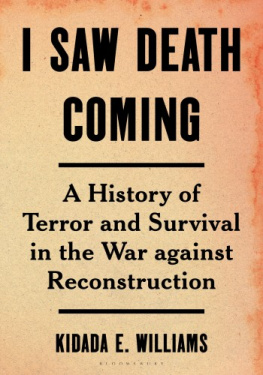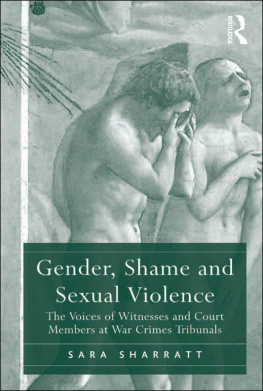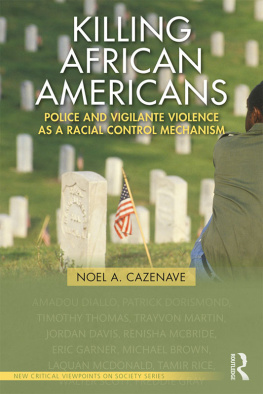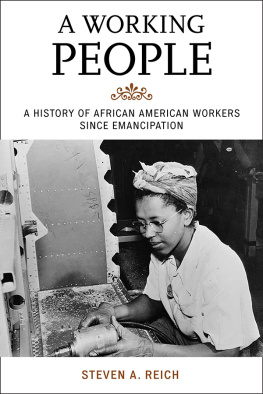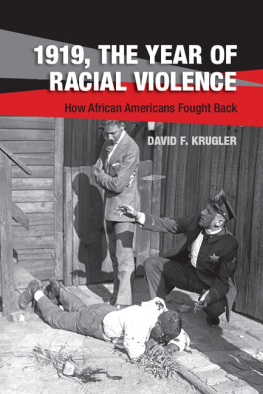Thank you for buying this ebook, published by NYU Press.
Sign up for our e-newsletters to receive information about forthcoming books, special discounts, and more!
Sign Up!
About NYU Press
A publisher of original scholarship since its founding in 1916, New York University Press Produces more than 100 new books each year, with a backlist of 3,000 titles in print. Working across the humanities and social sciences, NYU Press has award-winning lists in sociology, law, cultural and American studies, religion, American history, anthropology, politics, criminology, media and communication, literary studies, and psychology.
They Left Great Marks on Me
They Left Great Marks on Me
African American Testimonies of Racial Violence from Emancipation to World War I
Kidada E. Williams
NEW YORK UNIVERSITY PRESS
New York and London
www.nyupress.org
2012 by New York University
All rights reserved
References to Internet websites (URLs) were accurate at the time of writing. Neither the author nor New York University Press is responsible for URLs that may have expired or changed since the manuscript was prepared.
Library of Congress Cataloging-in-Publication Data
Williams, Kidada E.
They left great marks on me : African American testimonies of racial violence from emancipation to World War I / Kidada E. Williams.
p. cm.
Includes bibliographical references and index.
ISBN 9780814795354 (cl : alk. paper)
ISBN 9780814795361 (pb : alk. paper)
ISBN 9780814795378 (ebook)
ISBN 9780814784860 (ebook)
1. African AmericansHistory18631877. 2. African AmericansHistory18771964. 3. African AmericansViolence againstHistory19th century. 4. African AmericansViolence againstHistory20th century. 5. LynchingUnited StatesHistory. 6. RacismUnited StatesHistory20th century I. Title.
E185.2.W67 2012
973.0496073dc23 2011039379
New York University Press books are printed on acid-free paper, and their binding materials are chosen for strength and durability. We strive to use environmentally responsible suppliers and materials to the greatest extent possible in publishing our books.
Manufactured in the United States of America
c 10 9 8 7 6 5 4 3 2 1
p 10 9 8 7 6 5 4 3 2 1
To my mother, my brother, and the memory of my father
Contents
1 The Special Object of Hatred and Persecution:
The Terror of Emancipation
2 A Long Series of Oppression, Injustice, and Violence:
The Purgatory of Sectional Reconciliation
3 Lynched, Burned Alive, Jim-Crowed in My Country:
Shaping Responses to the Descent to Hell
4 If You Can, the Colored Needs Help:
Reaching Out from Local Communities
5 It Is Not for Us to Run Away from Violence:
Fueling the NAACPs Antilynching Crusade
Acknowledgments
In writing this book I have accumulated more debts than I can repay. I was privileged to receive a great deal of financial and moral support to write this book from family members, friends, colleagues, archivists, and institutions who sustained me throughout the process of researching and writing it. What is most interesting to me is that these people, institutions, and resources came into my life just when I needed them most. After more than a decade of conducting research and writing about this project, I am pleased to finally acknowledge their generous contributions.
I could not have conducted my research and written up my findings without incredible support from the start of my efforts to research this book through its completion. My research took me to the Library of Congress, the National Archives, the Harlan Hatcher Graduate Library at the University of Michigan, the Moorland Spingarn Research Center, and the Schomburg Center for Research on Black Culture. I owe a special debt to the archivists, librarians, and administrative staff members who helped me locate the materials that I needed. As a result of their help, I collected more data than I could possibly use in this book. I also had the good fortune to receive generous financial support from the King-Chavez-Parks Future Faculty Initiative (KCP), the University of Michigan, Wayne State University, and the Ford Foundation.
I received an astonishing amount of support throughout graduate school. I started this project as an M.A. student at Central Michigan University, where I received a two-year KCP fellowship. Being able to devote my energies to researching and writing was a luxury that only a few students in my program enjoyed. The lessons I learned about navigating the academy from Joyce A. Baugh, Susan Conner, Annette K. Davis, Mitchell K. Hall, Timothy D. Hall, Sterling Johnson, John R. Pfeiffer, Patricia Ranft, David Rutherford, Dennis Thavenet, the late Gabriel Chien, and the late Johnny D. Smith have guided me over the years. As a doctoral student in the History Department at the University of Michigan, earning a Rackham Merit Fellowship, the Dean/Mellon Candidacy Fellowship, the Rackham Predoctoral Fellowship, and a Department of History summer research grant allowed me to travel to conduct my research and to write. I also had the great fortune to receive a one-year Ford Foundation Dissertation Fellowship, which not only financed a year of study but also introduced me to a whole new world of scholar-activism and fellowship with such scholars as Michelle Scott, Leslie Alexander, and Ula Taylor. While at Michigan, I had the amazing honor to work with Michele Mitchell, Matthew Countryman, Hannah Rosen, Sandra Gunning, Earl Lewis, Elsa Barkley Brown, and Julius Scott III. I can only hope that this book meets their expectations of my work and me. Finally, I am deeply appreciative of the immeasurable support I received from Lorna Altstettar, Chandra D. Bhimull, Pervis Brown, Sherri Harper Charleston, Sheila Coley, Gail J. Drakes, Kevin K. Gaines, Nsenga Lee Johansson, Martha Jones, Michelle Craig Mcdonald, Shani Mott, Moses Ochonu, Nicole Stanton, Penny Von Eschen, Tamara J. Walker, Stacy L. Washington, Shawan Worsely, and Tamara V. Young. Toward the end of my graduate education, I received a wonderful one-year position at the University of Oregon, where tremendous support and encouragement came from Martina Armstrong, Ellen Herman, Dayo N. Mitchell, Jeff Ostler, Martin Summers, Quintard Taylor, and the late Peggy Pascoe.
My good fortune continued after I completed my studies. I received a Ford Foundation Postdoctoral Fellowship, which gave me time to write and continued the support of the coterie of amazing Ford Fellows. I also earned a residency research fellowship from the University of Michigans Eisenberg Institute for Historical Studies, which allowed me to develop my thinking and writing about violence and trauma by participating in the Topographies of Violence series, whose guests included Timothy Tyson, Nikhil Pal Singh, and Isabel Hull. Kathleen Canning, Shannon Rolston, the other fellows, and the graduate students and faculty from the University of Michigan provided a warm and supportive environment. Detroits proximity to Ann Arbor has allowed me to maintain close relationships and broaden my intellectual development by participating in two of Michigans vibrant working groups. The first is the Institute for Research on Women and Genders Gender, Race, and History group. Hannah Rosen developed this group, which has furthered my thinking on gender-based violence. The second is the Department of Afroamerican and African Studies and the Department of Historys Long Civil Rights Movement group. Angela Dillard, Matthew Countryman, and Matt Lassiter developed this group, which has enriched my thinking on social movements and civil rights.


